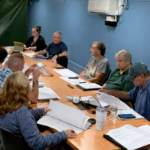Most of Thursday’s School Committee meeting involved analysis of Grade 6 math data and the possibility of “leveling” classes at that age as well as a review of Superintendent Carol Cavanaugh’s goals.
The latter is part of the School Committee’s evaluation of her job performance.
One of the superintendent’s goals is to examine Grade 6 math curriculum and instruction.
Using historical data, student course performance and MCAS and STAR test results, Cavanaugh said the math study group looked at about 300 students’ individual results and questioned whether leveling — grouping students by academic ability based on past results — would be appropriate at that grade level, one grade earlier than current practices.
Overall, she said “median student growth percentiles” had bounced back to about where they were before the pandemic.
Some of the data was broken down further by students with disabilities and with Asian and white distinctions, among other factors.
In addition, she reviewed students’ self-reporting on issues like feeling confident in math, receiving math help outside of school, completion of enrichment activities and learning from others in class.
With 52.1% of students reporting that no one helps them at home with math, member Adam Munroe questioned how that correlates with children from disadvantaged households not having access to the same outside resources like tutors.
The superintendent replied that if students need social workers or other means to assist them, the district makes sure they receive those services.
According to Cavanaugh, the evidence shows “students make greater gains when the disparity in learning within a single classroom is not as wide.”
She said she is working with teachers and administrators across three buildings to determine what it might look like to change how kids are grouped in math.
Middle School principal Matt Lefebvre said a lot of what educators learned in a year and a half of study has already impacted practices in classrooms. He praised teachers for their “thoughtful instruction,” calling them “exceptional educators.”
Chair Nancy Cavanaugh said the naming of groups is very important and something students are concerned about.
“It becomes a conversation among peers, and that can be stigmatizing,” she said, urging the discovery of a way to avoid that from happening.
Member Lori Nickerson said parents have long discussed when their children get placed in a certain level in Grades 7 and 8. She questioned whether “making another track pigeonhole even earlier” is wise.
Nickerson noted, “People don’t want to feel like Grade 6 is determining what AP course the kid can take in high school.”
Vice chair Amanda Fargiano urged administrators not to lose sight of the top learners either at a time when students “may feel awkward to be smart.” Fargiano said she is concerned about meeting the needs of all students.
“What do you hope to accomplish?” she asked the superintendent.
“Giving kids exactly what they need, because a big continuum doesn’t work,” Carol Cavanaugh replied.
Students mixed in a classroom with different levels of understanding may result in some not wanting to put their hands up to say, “I don’t get it” when they see their peers grasping the material, she said.
Lefebvre said it is an opportunity to improve the learning experience for “new little middle school” students but must be approached “super thoughtfully.”
Nickerson said “leveling” adds to the pressure students put on themselves. Although students may be struggling, it does not mean they are not trying their best. And “high achievement in this district means high stress comes with it. … Are we bringing that down by a grade?” she asked.
Student representative Jack Ianelli said leveling in Grade 7 impacts later years, but it is easier to apply yourself more in high school. Being more involved within your level can help get you to the next step, he said.
Fargiano said what high school courses a student is enrolled in does not have to be “career limiting.”
“But that’s how the kids see it,” Nancy Cavanaugh said.
The superintendent noted that she would be returning with more information at future meetings.
Other goals reviewed
A lengthy review of the superintendent’s goals also featured all the actions taken to date to meet them.
The goals are about writing curriculum, instruction and assessment; the co-teaching model at the middle school; alignment of social justice/DEI (diversity, equity and inclusion} efforts; enrollment growth; analysis of Hopkinton experience for students; and a 360-degree assessment of district climate.
Nancy Cavanaugh explained that the superintendent’s evaluation must be done before the May election, with the present committee able to observe her work throughout the year. Noting it is “kind of an awkward process” to be done in public, the committee chair added presenting all of the “indicators” to back up work done to date is a massive undertaking.
Fargiano asked about programs partnering with businesses for students who are pursuing paths other than college.
Carol Cavanaugh said she hears from middle and high school counselors that a big piece of their work involves the stress and pressure kids experience. “It has to be OK to say, `I’m not going to a four-year college next year.’ ”
Assistant Superintendent Jeff LaBroad spoke about a grant to provide access to students in a uniform way so there is equity and sustainability among different opportunities.
Committee members praised the superintendent for her comprehensive presentation, though a few commented on her having too many goals.
Carol Cavanaugh said the goals were chosen with the district’s “all means all” mantra in mind. She added that several are carried out over multi-years and will not “get tied up with a bow at the end of this year.”
Budget approved
The committee voted formally to approve a fiscal year 2025 budget of $63,144,790, an increase of $3,207,037 over the previous year.
Nancy Cavanaugh said she had not received feedback from the public about the budget as she had during prior years.
Nickerson said a parent raised concern about the reduction of the social-emotional learning (SEL) director’s position, noting that it took a long time to get the role in place.
Carol Cavanaugh said there is a plan to distribute those efforts to counselors, assistant principals, the assistant superintendent and more. They will see how things go over the next year now that the programs are in place and it is a matter of maintaining them.
Fargiano said she is comfortable with the budget and noted an increase of 3.1% in contractual obligations meant there was little room with which to work.
“Careful decisions were made, and there were sacrifices to get here,” Fargiano said.
School naming policy, process addressed
The board approved wording changes to its school naming policy considering the upcoming replacement to Elmwood School. The name, it said, should be reflective of the community’s values, culture and unique characteristics.
The policy also noted there is a trend moving away from naming buildings after people, living or dead. The wording suggests “exercising caution” if pursuing that route.
Carol Cavanaugh said March 14 would be the date the School Committee would be asked to vote on a school name following her recommendation. Prior to that, the superintendent spoke about releasing the news to local media, the town, parents and others to come up with suggestions. Students will be asked as well.
The process will include a meeting Feb. 1, compilation of a list by Feb. 15 and the recommendation and vote a month later.






















0 Comments